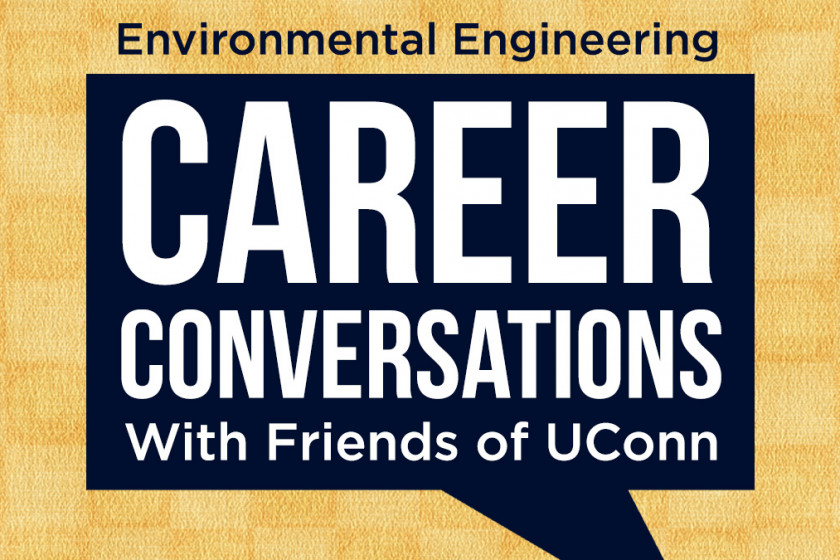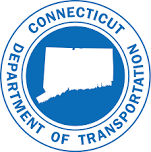
With the semester starting back up, we also started our weekly Career Conversations! These are panel discussions that our staff moderates in which different employers and UConn alumni in the engineering industry lead a discussion about companies, opportunities, and life beyond UConn.
This week we had the Connecticut Department of Transportation (DOT) and Tighe and Bond, which has numerous engineering disciplines at their companies. We had Jennifer Reynolds from Tighe and Bond and Adam Fox from the Connecticut DOT.
Here is what you missed.
Q: What inspired you to pursue a career in the environmental engineering industry?
A: Jennifer: For me, I was an Environmental Engineering major for most of my undergraduate career and graduated under Chemical Engineering. I decided to work for a firm that focused on mechanical, but I found not to like it, and then I found Tighe and Bond.
Adam: I was an Environmental Engineer out of college and worked for a firm where I partially worked for Connecticut DOT on small consulting work and made a full pivot into the career.
Q: What is your day to day workflow look like at your job?
A: Jennifer: I tend to do high-level studies with clients based on their needs for a project; whenever a perplexing problem comes about, I speak to my peers and higher-ups about tackling the issue. I also do construction administration, overlooking 3-6 projects at a time, continually looking over designs and adjusting them
Adam: I have what I call a “Whack A Mole” style day where problems always arise, and we seek to minimize and eliminate them. I mainly address wildfires and managing staff projects with peers. When regulations change, and I often work on how we can adjust to changes.
Q: What kind of environment does your workplace provide
A: Adam: We have a robust training program for newly hired employees, mainly young and ambitious engineers, to give them a broad range of experience early.
Q: As an Alum, what were some of the skills you’ve gained from your experiences from the School of Engineering and UConn as a whole that helped you in your careers at these companies?
A: Jennifer: What I learned in my Fluids and Heat Transfer classes turned out to be very common in what I do now, but in general, the ability to handle pressure, because of the juggling of responsibilities. Presenting for senior classes fostered better public speaking skills because I was able to think on my feet with confidence when answering questions.
Adam: I went to Syracuse, but in my undergraduate career, aside from what Jennifer has said, the collaborative classes were the most important to me because I got to work with so many different personalities and backgrounds; it helped prepare me for what I do now.
Q: What jobs are in the Environmental Engineering field, aside from consulting? Are there any research positions?
A: Jennifer: To my knowledge, there isn’t much, but I know that there are some firms that put engineers in the field a lot because you need to see what problems in that space arise to be better equipped to tackle it.
Adam: Most careers focus on being out and doing fieldwork.
Q: How much does an internship help in terms of finding a job? Is it significantly harder to get start a career without internship experience? Would a post-bachelor degree internship be beneficial to a job starting a career?
Jennifer: If you don’t already have internship experience, craft a narrative based on your experiences and skills that can make a compelling case for why you are the most qualified. In terms of choosing between options post-graduation, whatever honestly works best for you.
Adam: Best thing would be to find a permanent job, which will give you more exposure and experiences early on.
Q: What are three things an applicant needs to be hired? Does a work-life balance factor into an applicant receiving a job?
Jennifer: Work-Life balance shows drive, ambition, and time management. In terms of three things, it’s hard to say if there’s a list of criteria other than showing how experiences are relevant to your development, core values, and gifts.
Adam: The best thing to do is make a tailored resume for the career that you are currently pursuing.
Q: If an applicant has a low GPA, should it be included on the resume? And How can an applicant approach an employer who asks about it?
Jennifer: It goes back into networking; having interpersonal connections can do a lot for that
Adam: You have to make a plan for that if that is your case. Employers will ask about it but talk about owning up to it and showing how you’ve grown and adjusted.
Be sure you check back next Wednesday for our next Engineering Conversation at noon!


